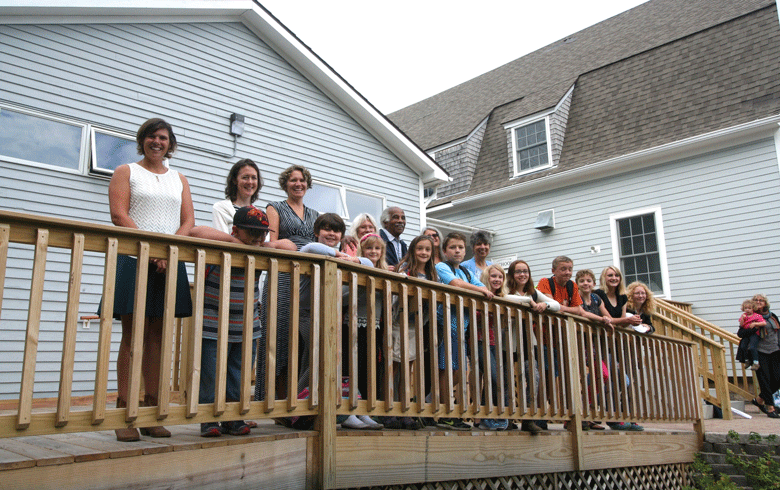We listened attentively as writer Anica Mrose Rissi read a chapter from an upcoming book. Everyone in the Zoom room was captivated—eyes widening during spooky parts, smiling and laughing during funny parts.
The Zoom room was populated by 5th-8th grade students from Maine’s outer island one-room schools on Monhegan, Frenchboro, Islesford, Great Cranberry, Cliff, and Isle au Haut islands, plus Cuttyhunk, Mass. It was the first of six such meetings with Anica Mrose Rissi, a published author who grew up on Deer Isle.
The students had enrolled in WordCraft, a virtual six week writing program offered by Island Readers & Writers (IRW), a Mount Desert-based nonprofit.
After six weeks of focused writing and revision, the young authors shared their stories with peers…
Coming from one-room schools, the participating students do not have many—or, in some cases, any—age-level peers at their own schools.
“It’s difficult for them to receive feedback from or be inspired by peers at their ability level,” said a teacher, whose school has just one middle schooler. Participating in WordCraft was a welcome opportunity to collaborate with peers and hear other perspectives.
During that first WordCraft meeting, we all listened attentively as Rissi read excerpts of her work, from drafts in progress, to the Anna, Banana series and The Teacher’s Pet. Rissi also provided relatable inspiration, telling stories about her writing process, including what she does when getting stuck or running out of fresh ideas (why not take a break and climb a tree?).
After the first meeting, students set out on their assignments, curated by the IRW team in the learning platform Moodle. Weekly writing prompts had different focus areas, from “Creating Unforgettable Characters” to “Building Fantasy Worlds” to incorporating dialogue, and more.
Each week culminated with students submitting their writing for feedback from Rissi, and that feedback became fodder for the next week’s Zoom call as students shared what they enjoyed and what was challenging about the previous week’s work. Most students started with one story idea, editing and expanding it throughout the six weeks, resulting in well-developed final products.
Alison Johnson, who directs school programs for Island Readers & Writers, was impressed with how the student work developed.
“Reading their stories through IRW’s WordCraft program and watching their work progress was remarkable.”
After six weeks of focused writing and revision, our young authors shared their stories with the Outer Islands Teaching & Learning Collaborative, reading their own work to peers and younger students on other islands. While listening to an 8th grade student read her story, “Lost at Sea,” one 2nd grade boy illustrated ocean scenes to go along with it, proudly sharing his work after the read-aloud.
The read-aloud audience also included Douglas Cornman from the Maine Seacoast Mission. Impressed with the students’ stories, Cornman encouraged the students to submit their work to the Mission’s annual publication, The Island Reader.
“It’s always so much fun to listen to what these kids are doing,” Cornman said.
The student writers also enjoyed their WordCraft experiences.
“I liked being able to create my own world and try to write it with someone else’s point of view,” said 7th grader Gaby Teague.
Her sister Isabelle Teague, a 5th grader, shared a similar sentiment.
“I liked being able to imagine a new world, create characters, and most of all, write.”
The larger peer network included six multiage one-room schools. The program design helped teachers, freeing them to focus on teaching younger students while their older students were engaged in WordCraft sessions.
“This special time has made a big difference for my [students] not only academically, but socially,” said one teacher.
Another teacher noted that in one room schools, “Even if you have a couple of students at the same grade level, you’ve heard the same voice, offering feedback or suggestions, for multiple years.” The program allowed students to hear new perspectives on their work, both from peers and a published author.
Rissi speaks to the power of the group: “The opportunity to be part of a creative community is a gift for any writer, including me, and it was such a treat getting to meet with the island students—my fellow writers—to discuss the surprises, triumphs, and challenges we encountered on the page, share how we approached them, and learn from one another. Our weekly conversations about writing, revising, and storytelling left me invigorated and inspired. I was so impressed by the students’ openness, excitement, and creativity.”
Robin Chernow is a community development officer with the Island Institute, publisher of The Working Waterfront, who works with island and remote schools.





